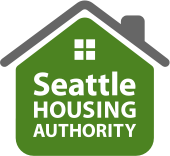Updated February 14, 2026
The federal government is currently experiencing a partial shutdown. Seattle Housing Authority services are not impacted at this time.
Three key things to know
-
Federal funding for the Emergency Housing Voucher (EHV) program will stop in 2026. SHA will continue to support households that have Emergency Housing Vouchers through 2026, as federal funding for the program winds down.
-
Help is available for residents looking for information about immigration, food resources and Medicaid/Apple Health. While SHA cannot give legal advice, there are other trusted organizations that can assist.
1. Preparing for the end of the Emergency Housing Voucher Program
The Emergency Housing Voucher Program has been an essential tool for providing safe and affordable housing to Seattle residents. EHVs were part of the 2021 American Rescue Plan Act and were designed to assist individuals and families who are homeless, at risk of homelessness, or fleeing or attempting to flee domestic violence, dating violence, sexual assault, stalking or human trafficking.
Although the program was originally meant to run through 2030, the federal government has decided to end funding in 2026.
SHA will continue to support households with Emergency Housing Vouchers (EHV) through 2026, as federal funding for the program winds down.
- Transition options: SHA has developed multiple options to support long-term stability for EHV tenants.
- Direct communication: SHA is reaching out directly to tenants, landlords, and partners to share timely information.
- Our goal: To ensure every household has clear guidance and support during this transition.
- Contact us: EHV tenants, landlords and partners can contact SHA staff for support:
Email: EHV@seattlehousing.org
Phone: 206.615.3584
2. Federal budget changes and impact on SHA
 The One Big Beautiful Bill Act (OBBBA), signed on July 4, 2025, created new rules and funding levels for many federal programs. It includes cuts to health care, education and other key social services.
The One Big Beautiful Bill Act (OBBBA), signed on July 4, 2025, created new rules and funding levels for many federal programs. It includes cuts to health care, education and other key social services.
Although we anticipate that reductions to funding for housing will be part of the federal budget, we won’t know the specific impact until Congress decides how money will be distributed through the appropriations process. In the meantime, SHA has an approach for keeping SHA tenants and services stable. Our 2026 budget maintains:
- Services that residents rely on, including maintenance, safety, security and resident supportive services.
- Our voucher program, which will help more families than ever.
- Staffing levels, as our work for tenants remains a top priority.
- Our real estate development pipeline, which includes our redevelopment projects for current residents, and building projects needed to meet Seattle’s need for affordable housing.
In order to protect residents and voucher recipients, we will continue to monitor events at the federal level and to manage our resources carefully in order to better adapt to the anticipated federal cuts in 2026 and beyond. As events continue to evolve, we will share updates when information is reliable and useful for decision making.
3. Help is available for residents looking for information about immigration, food resources and Medicaid/Apple Health.
Immigration
Some residents may have concerns about immigration issues or possible enforcement by ICE or the police. SHA staff cannot provide legal advice, but other organizations can. View a list of organizations who can help on immigration issues.
Medicaid/Apple Health
New eligibility rules will go into effect in 2026 and 2027. While SHA does not administer Medicaid, it is an essential resource for many of our tenants and voucher recipients. We recommend contacting hca.wa.gov directly for more information.
SNAP Benefits
New eligibility rules will go into effect in 2026 and 2027. While SHA does not administer SNAP, it is an essential resource for many of our tenants and voucher recipients. We recommend contacting dshs.wa.gov directly for more information.
If you are in need of food right now, visit wa211.org/resources/food or foodlifeline.org/find-food
